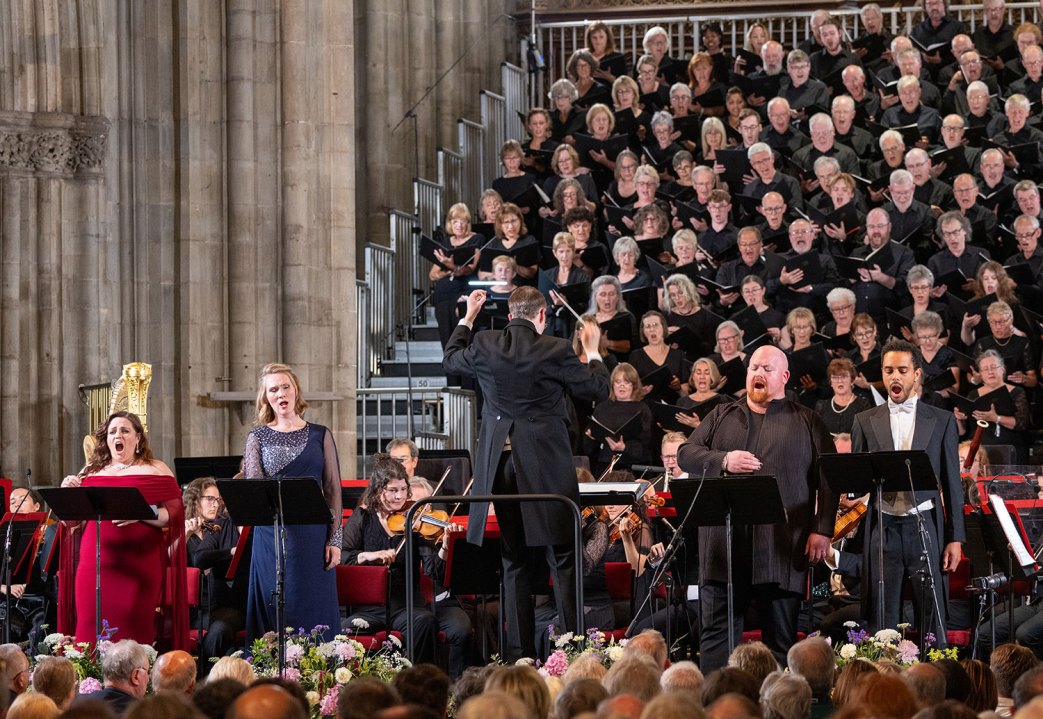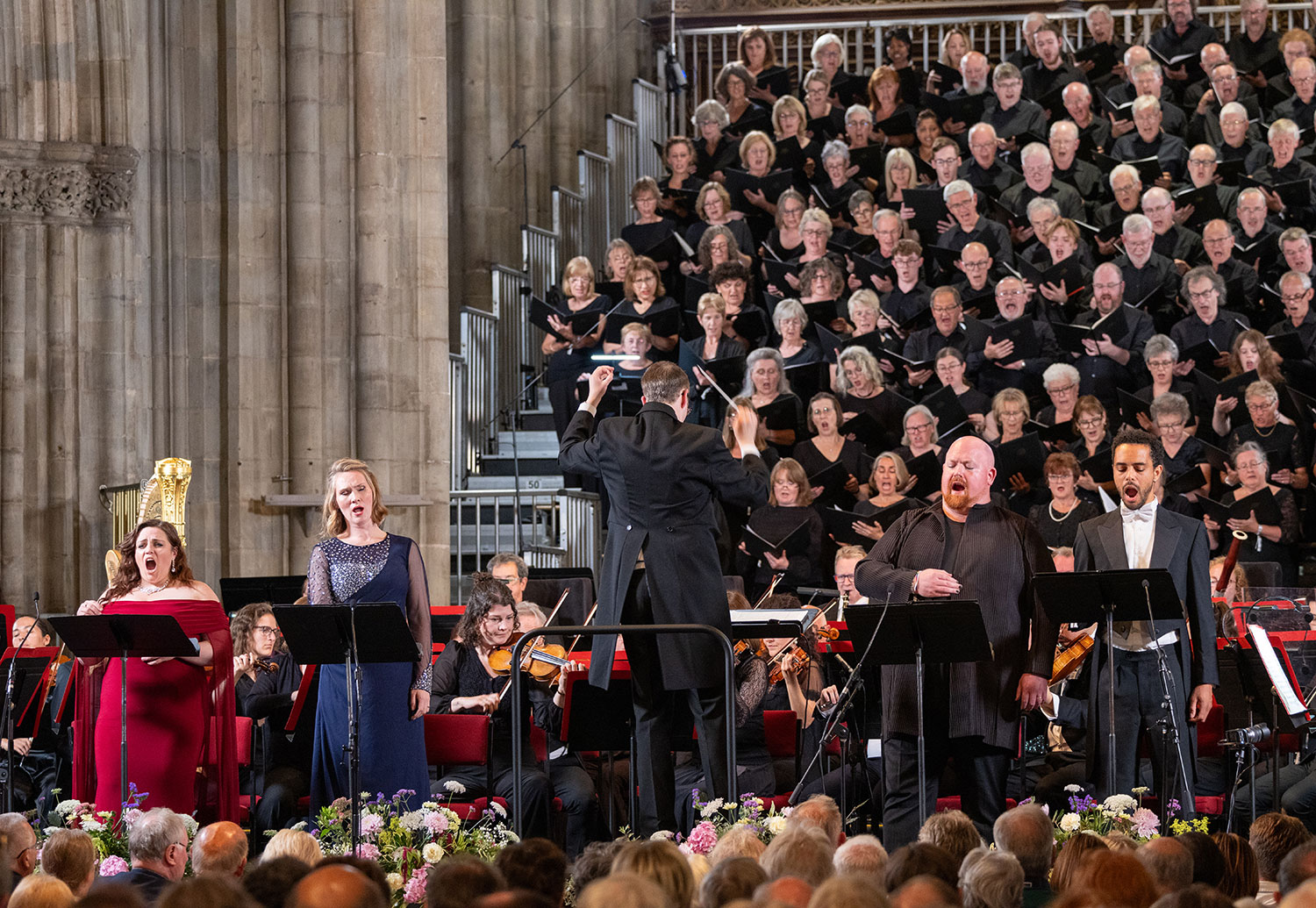The Proms have started but there is a world elsewhere, and in Worcester Cathedral the 296th Three Choirs Festival set sail with a concert that couldn’t have happened anywhere else. A few years back I caused grave offence when I described the Three Choirs as a ‘home of lost causes’; as if, coming from The Spectator, that could ever be anything but a compliment. In truth, there’s still no classical music festival that provides such a sense of being plugged into a vital and ancient tradition – of being so close, as Elgar put it to ‘the living centre of music in Great Britain’.
So here we were with the Philharmonia under the baton of a cathedral music director (Worcester’s Samuel Hudson) and a large amateur chorus cut from the same cloth as the lively, near-capacity audience. It looked and felt like a community expressing itself musically on the largest scale. No arm-waving attempts at crossover; no big-name touring orchestras unloading their Summer 2024 Deluxe International Festival Programme for the third time this week (if it’s Thursday, it must be Edinburgh). None of that: just honest, imaginative fare, locally sourced and served fresh.
Grace-Evangeline Mason’s symphonic poem The Imagined Forest opened the concert – an iridescent fantasy commissioned for the 2021 Proms, though apart from a few jangles of tuned percussion (young composers are required by statute to include these weird marimba outbursts), it might have been written by a student of Ravel. Again, it’s probably necessary to clarify that this is a compliment.
Anyhow, it worked nicely as a set-up for the vibrant blocks of colour and shadow with which Holst constructs his ‘Hymn of Jesus’. Hudson deployed cathedral choristers on either side of the main chorus and orchestra, while the cathedral organ loomed behind the rood screen and occasionally picked out a bass line in a low, dark rumble. You really felt the music as a physical force – muscular, three-dimensional and sung with energy by the Festival Chorus. Holst was born 150 years ago this year, and it still feels as if we barely know him.
We certainly don’t know Charles Stanford’s Stabat Mater, which closed the concert. It’s a mighty work, more like a choral symphony than an oratorio (Stanford wrote it for Leeds in 1907) and the old boy argues his case so vigorously that, rather to my own surprise, I found myself leaning forward in my folding seat, wondering how it was all going to end.
The solo quartet included Nicky Spence (on fine Heldentenor form) and the soprano Rebecca Hardwick, who crowned a series of increasingly stormy choral climaxes with a halo of bright, tingling sunlight. Bernard Shaw’s gloriously cancellable maxim that Stanford is at his best when ‘going Fantee’ has always seemed basically sound: Stanford’s genius burns brighter (and certainly fresher) in the Songs of the Sea than in his symphonies or requiem. This performance suggested otherwise – not a bad anniversary gift for a composer with a patchy posthumous reputation.
In Buxton the International Festival also creates bespoke events, here tailored to the town’s Edwardian opera house – a Frank Matcham gem that resembles the London Coliseum, but shrunk to a workable size and dropped into a fold of the High Peak. Nothing suits it better than red-blooded Italian melodrama – and Jamie Manton’s staging of Verdi’s Ernani certainly delivered.
True, the setting was generic 21st-century brutalist-minimal; the costumes the now-familiar monochrome drab-wear that does little to help clarify the different ranks and allegiances that drive the plot of this undercooked prequel to Don Carlo. But the orchestra of Opera North surged and sang under Adrian Kelly, Nadine Benjamin was incandescent as Elvira and as Silva, Alastair Miles was immense; his voice sulphurous and rasping with fury as (spoiler alert) he took his long-delayed revenge.
Meanwhile, you still – just – have time to see Opera Holland Park’s double bill of Il segreto di Susanna and Pagliacci, and you should: you really should. The first opera was a delight when OHP did it in 2019 but somehow, with the same singers (Clare Presland and Richard Burkhard) and conductor (John Andrews), it’s even fizzier now. Even the butler, Sante (a rubber-limbed John Savournin), seems to exude music – not bad for a completely silent role.
Then, after the interval, director Martin Lloyd-Evans updates Pagliacci to a blighted postwar Italy and sets it on fire. Every gesture carries meaning, every note (Francesco Cilluffo conducts) quivers with passion and the entire cast – Alison Langer’s heartsick, careworn Nedda; Robert Hayward’s brutish Tonio and above all, David Butt Philip as a volcanic Canio – sings and acts with a conviction so intense that it’s almost frightening. This is an electrifying piece of music theatre, as intelligent as it is savage, and easily the best Pagliacci I’ve ever seen. Phenomenal. Catch it while you can.








Comments